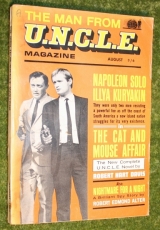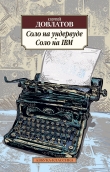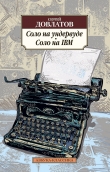
Текст книги "[Magazine 1966-08] - The Cat and Mouse Affair"
Автор книги: Robert Hart Davis
Жанры:
Боевики
,сообщить о нарушении
Текущая страница: 1 (всего у книги 6 страниц)
The Cat and Mouse Affair
By Dennis Lynds
August 1966
Volume 2, Issue 1
Act I: Who Shoots Last, Shoots Best
Act II: Go, Bid the Soldiers Shoot!
Act III: Coup, Coup, Who's Got the Coup?
Act IV: Where are the Rebels of Yesteryear?
ACT I: WHO SHOOTS LAST, SHOOTS BEST
ONE
There was a fog that night over San Pablo.
San Pablo is the capital city of Zambala, the new island nation off the northeast coast of South America.
The former British colony has been free for some years. Free and proud of its stable and progressive government under the leadership of its liberation-hero and premier, Malcolm Martinez Roy—M. M. Roy, the Lion of Zambala!
San Pablo is an old pirate city, built in an area of lowland swamps. Its deep, sheltered harbor is one of the finest in the world. The long, curving waterfront road is lined with piers on the waterside and the old buildings of the pirate city on the landside. The waterfront is an area of tourist shops, restaurants good and bad, and hotels both old and new.
One of the oldest hotels is The Morgan House. It is back from the water, just off Front Street. It is a quiet hotel, frequented now largely by sailors and their women friends.
Its tavern is a noted tourist site, a place where the tourists can see some life-in-the-raw at a minimum risk. No tourists actually stay at The Morgan House—that is life a little too raw. The rooms on the second, third and fourth floors of the old building are cheap and used only by sailors, furtive men with no visible occupations, and the transients of the tropics.
This night, because of the thick and evil-smelling fog, the tavern was empty of all but a few silent sailors. By midnight the tavern was as silent as a tomb. Only the distant horns of the buoys, the far-off bells, the faint lap-lap of the water against the piers, could be heard in the tavern, where a last few sailors drank themselves to sleep.
Shots tore the fog and the silence, just after midnight.
Shots from the second floor of The Morgan House.
The owner of the hotel, one Nathan Bedford, did not go to investigate. He knew violence too well. He immediately picked up his telephone and called for the police. Then he stationed himself at a particular corner of the bar.
From this spot, and only from this spot, Bedford had a clear view of the front stairs and of the back stairs. They were the only two ways out of the hotel.
As Bedford watched and waited, he held a large, heavy pistol in his hand out of sight beneath the bar.
But no one came down the stairs.
When the police arrived, no one had come down the stairs.
Bedford nodded to the stairs, raised two fingers to indicate the second floor. There were four policemen. Three constables and a sergeant, all dressed in the khaki shirts and shorts, with the black Sam Brown belts, the military caps and high socks made so familiar throughout the world by the British. The large chevrons of the sergeant seemed to bristle.
"Shots, Nathan?"
"Two. No one has come down, Sergeant."
"Someday we will have to close you down," the sergeant said.
With that, the sergeant led two of his men up the front stairs. The third policeman remained on guard at the foot of the rear stairs. The sergeant and his men, covering each other, went from room to room on the second floor.
They found the dead man in room 202.
The sergeant looked at the dead man on the floor, then at the man standing in the center of the room with his pistol still in his hand.
"Good evening, sergeant," the man said.
He was a tall man, broad and athletic. His jet-black hair was cropped short, and he wore a simple white linen suit. But his face was a face the sergeant stared at. A face the sergeant knew only too well. The sergeant blinked, began to stammer.
"Sir! I—"
The tall man smiled. "I have touched nothing, Sergeant. All remains as it was. You will note the pistol in the dead man's hand. It has been fired once. Luckily, I came armed and am a better shot."
"Yes—Yessir!" the sergeant stammered.
"Get hold of yourself, Sergeant. You have your duty to do. Take my weapon and call your superiors at once."
The sergeant nodded, took the pistol from the tall man, and barked an order to one of his men to call the inspector. Then he turned and saluted the tall man.
"If Your Excellency will be seated," the sergeant said, "Inspector Tembo will be here immediately."
The tall man, M.M. Roy, Premier of Zambala, sat down and lit a long cigarette.
Some hours later, dawn beginning to break over the port city of San Pablo, the fog blown away on the dawn wind, Inspector James Tembo completed his interrogation of the premier at the central police station of the city.
Tembo rubbed a gaunt chin as he closed his book.
"That should do it, Your Excellency. The dead man has been identified as Pandit Tavvi, a known leader of the Stengali. You say you went to that room to meet with the Stengali?"
The premier nodded. "I did, Inspector. Foolish, perhaps, to go alone. But I will try almost anything to bring the Stengali back into the main stream of Zambalan life. You know that has always been my cherished policy. The continued terrorist opposition of the Stengali is a frightful scar on our country. We must all work together. Zamyatta has accepted the role of peaceful opposition. Why not the Stengali?"
Tembo scratched his chin. The inspector was a small, bright man with quick eyes. "Not, I fear, as long as Max Steng lives. I have met him. He is a man of absolutely rigid principle, and he opposes you."
The premier began to pace. "I know! That is why I went. They said that Steng would be there. We were friends once. But I should have known better. Only Tavvi was there. Luckily I do not appear to have lost my touch with the pistol."
"No," Tembo said. "Tavvi was a professional assassin, too."
"I was very foolish."
Tembo rubbed his thin chin. "It seems that your security chief was more foolish."
The premier turned to face Tembo. "Mura Khan? What—"
"He was killed less than ten minutes after you killed Tavvi, Your Excellency," Tembo said. "Shot on the street. My men have a Stengali in jail. He was found at the scene. He denies the killing, of course, but we know he is a Stengali."
Premier Roy paced the office. "I was wrong then. They must be destroyed. But it must be justice, not a political act."
The premier faced Tembo. "Well, are you going to charge me?"
"Charge you, sir?"
"Inspector, I have killed a man! There must be a full investigation. No man is above the law in Zambala! You will charge me. I will post proper bail. I will suspend myself from office until exonerated. Deputy Premier Gomez will act in my place."
"But sir, it is obviously self-defense."
"An inquiry is required, is it not? Then there will be an inquiry. I want the same treatment you will give that Stengali suspected of killing Mura Khan. Further, since we seem to be dealing with a series of assassinations by the Stengali, I will recommend to Gomez that he form an international tribunal to oversee the investigation. I will have him appoint Carlos Ramirez as chairman!"
Tembo seemed excited. "Your Excellency, this will be good for Zambala. No one above the law! And Carlos Ramirez! Our greatest man and greatest poet! May I also suggest Martin O'Hara?"
"Good," Roy said. "That will show how impartial we in Zambala are. O'Hara is one of our oldest colonial families. Now, shall we get on with it, Inspector?"
The inspector stood up and bowed the premier out, to be charged like any common criminal. Within an hour all of San Pablo knew what had happened; within three hours all of Zambala knew. There was a great outcry against the Stengali underground organization.
The streets of San Pablo were jammed with cheering students. The army declared itself solidly behind the premier. Carlos Ramirez, the old pacifist, poet, and national hero of Zambala, accepted the post of chairman of the international tribunal to investigate the situation.
The whole world applauded the action.
Some time later, alone in his office, Inspector Tembo made a telephone call.
The man Tembo called, Martin O'Hara took the message in his old house high on a hill overlooking San Pablo, hung up, and went straight to a bookcase in his elegant library. He touched the bookcase, and it opened. He went through the opening. The secret door closed behind him.
He stood alone in a bright room lined with steel and heavily soundproofed. Instruments, filing cabinets, maps and communication equipment filled the first room. Along a windowless corridor there were unmarked doors into other rooms, the doors having neither knobs nor visible locks.
In the first room Martin O'Hara went directly to a large electronic console and flipped a switch.
"Code ten. Code ten. Agent O'Hara, Section two Chief in Zambala on direct relay to Waverly in New York. Code ten. Come in, Mr. Waverly."
TWO
San Pablo Prison is a combination of old and new. The center part of the building that stands on the side of a hill just south of the city is the grim old original prison from the pirate days. The two wings are more modern, built within the last twenty years to hold the enemies of the colonial government before independence.
As with all buildings in San Pablo that are more than simple dwellings, the prison stands only four stories high. This is earthquake country, and four stories is as high as should be built. In the case of the prison, the hill rises steeply behind the old center section, and the hill itself touches the building up to the third floor.
It was from a cell on the third floor of the old part of the prison that the Stengali escaped, two days after the murder of the Security Chief Mura Khan. The hour was late and the night was dark. The Stengali made his break when a guard carelessly entered his cell to gather up his plate when he thought the Stengali was asleep.
The Stengali easily overpowered the guard, locked him in his cell, and made his way to an unbarred window in the guard room at the rear of the third floor. By chance, the guard room was empty at this time. The Stengali easily got out through the window and dropped the few feet to the hillside behind the prison.
The Stengali was halfway up the hill when the guard on the roof spotted him. Another fifty feet and he would have made good his escape. But the machine-guns of the guards on the roof cut him down. Before the guards could reach him to see if he was alive, he finished their work with his stolen pistol rather than be taken alive again.
The guards carried the body back into the prison. They were not happy. They had let him escape. They had let him take a pistol. Now he was dead and could not be questioned. They were very quiet as they carried him back into the prison.
The night returned to darkness and to silence.
A man stepped from a clump of trees at the top of the hill behind the prison. This man stood in this night and watched the guard carry the dead Stengali back into the prison.
He was a strange figure in the night as the moon rose above San Pablo.
He was an old man, stooped and with a twisted left arm. One eye was covered with an evil-looking patch. His face was scarred like some rutted old road, and his hair was white and hung down over his face in ragged strings. His clothes were rags, and his feet were wrapped in filthy cloths. He carried a long, thick staff which he leaned on as he stared down the hill at the silent prison.
Suddenly, he seemed to raise his hand to his lips and bite the knuckle of his thumb. At the same time he seemed to bow his head toward the dark bulk of the prison. Then he turned sharply and moved off down the hill toward the road on the other side of the prison. He moved with amazing agility for a man so old and crippled.
As he reached the road, he stood clear in the moonlight for a long moment. It was then that the cup suspended around his neck was visible, and the mark on his left hand that told the world he was a beggar!
A strange beggar. Moments after he reached the road a long, black car glided all but silently up and the old beggar got in. The car drove off into San Pablo.
The old beggar, intent first on the prison and then on the car that came for him, had not seen the other events his appearance on the hill had set in motion.
The moment the old beggar had started down the hill, another man had appeared from out of the night near the prison. This man was tall and dressed all in black. He followed the old beggar to the road and vanished into the dark trees between the road and the prison.
As he crossed a patch of moonlight his face showed briefly—or did not show!
The second man, dressed all in black, was masked! A black mask covered his entire face except his eyes, and his dark hat was pulled low over his face. When the long car picked up the beggar, the man in black followed form the trees in a jeep that had been carefully hidden there.
The third man had been seen by neither of the other two.
He was a small, slender man also dressed all in black, but neither masked nor did he wear a hat. In the dark he followed both the beggar and the masked man, his blond hair catching the moonlight from time to time. As he watched the beggar reach the road, and the masked man vanish among the trees, his quick and bright eyes narrowed beneath an habitually lowered brow.
With the silence and agility of a cat, he moved closer to the road and the beggar. Beneath the unruly blond hair, cut like the round haircut of some modern knight-errant, his handsome Slavic face was both quizzical and a trifle amused. He was about to move even closer when the black car appeared and picked up the beggar.
Immediately, the jeep emerged from the trees with the masked man driving and followed the black car toward San Pablo. The small blond man ran swiftly to the road. He bent down where a drainage culvert ran beneath the road and drew out a motorcycle. In an instant he was on the cycle and roaring off after both the black car and the jeep.
As he rode he guided the motorcycle with one hand. With the other hand he drew a pencil-like object from his pocket, pressed a tiny button, and spoke.
"Report to Zambala Headquarters. Agent Kuryakin following two men. Stengali suspected of murdering Mura Khan has been killed trying to escape. Both men being followed were at the scene. One is an old man dressed as a beggar, one eye and a twisted left arm. The second man is dressed in black and is masked. See what you have on them and check with New York."
There was a shot silence as the motorcycle sped through the night. Then the pencil-radio spoke low in the voice of Martin O'Hara.
"Roger. Check will be run, Illya. And be careful. The Stengali usually dress in black. They are very dangerous. They would have been watching the prison."
Illya Kuryakin concentrated on following the jeep ahead, and beyond the jeep the black car. The road was deserted here at the edge of the city, and the small blond U.N.C.L.E. agent was riding the motorcycle with the lights out.
"That Stengali was our only lead to the assassination plots," he said into the pencil-radio.
"I know," O'Hara said from the hidden rooms of local U.N.C.L.E. headquarters inside his house. "Wait. Here is the check. All negative. From your descriptions neither men are in our files, but the computer emphasizes that the Stengali often dress in black."
"Thank the computer for me," Illya said dryly. "Get the descriptions to New York and see what we might have there. Report that I am continuing to follow."
"Very well, Illya, but be careful," O'Hara said.
Illya clicked off his pencil-instrument and returned it to his pocket. As he did so he took his eyes form the road for an instant. When he looked up again it was too late.
The jeep was slewed directly across the road!
The masked man was already firing an ugly Soviet-made submachine gun.
By the reflex action that had saved him so many times, Illya swerved his motorcycle directly toward the ditch that bordered the dark road and began to hurl himself sideways.
Again, he was too late.
The motorcycle struck the long, thick root of a tree and Illya Kuryakin hurtled helpless through the air in the dark night.
THREE
Behind the innocent façade of New York brownstones, and the one modern yellow-brick building, the impregnable complex of the headquarters of The United Network Command for Law and Enforcement goes about its never-ending battle to keep the world safe for the ordinary citizen. This battle requires all the complex and secret equipment that fill the secret rooms, the vast network of communications that keep New York in touch with all the other far-flung centers of U.N.C.L.E. And the task of protecting the ordinary citizens of the world requires many extraordinary citizens.
Every hour of the day these extraordinary men go in and out of the entrance to Del Floria's cleaning & Tailoring Shop, unnoticed by the citizens they protect. They go in and out by any of the other three known entrances to the U.N.C.L.E. complex, or by one of the secret river tunnels from the river to the lower level of U.N.C.L.E. headquarters.
One of the most extraordinary of these men, the only man in New York who knows the location of the fifth entrance to U.N.C.L.E., is Alexander Waverly, Chief of U.N.C.L.E. in the western hemisphere, the only member of Section I—Policy and Operations in the western world.
Another of the more extraordinary men was Napoleon Solo, Chief Enforcement Agent in Section II—Operations and Enforcement. Solo, dressed as always in the impeccable young executive clothes that made him seem no more than another handsome young bachelor and successful junior executive, now sat with Alexander Waverly in the small but complete office of the Chief.
Through the windows there was a fine view of the city in the afternoon sun, and anyone looking in would have seen no more than a businessman talking to one of his assistants. The windows, of course, were never opened, and the glass was bulletproof.
Waverly himself, a gentleman over fifty but no one knew how far over, was the picture of the tweedy management man. His iron grey hair was neat if shaggy. He held an unlighted pipe, and turned the gaze of an aristocratic bloodhound on Solo.
"The last report of Mr.—uh—Kuryakin indicated that he was following two men who had been watching the San Pablo prison. Our records came up with nothing on either man, I'm afraid."
"And the Stengali prisoner was killed," Solo said. "Our only lead to what might be happening down there."
"Shot escaping, I'm afraid," Waverly said. "A pity. Although I understand the Stengali have a suicide rule if hopelessly captured."
"Shot while escaping can be arranged," Solo said.
Waverly looked for his matches in his waistcoat pocket. "I'm aware of that, Mr. Solo. That is precisely why Mr. Kuryakin is following those men."
Waverly found his matches on his desk and began to light his pipe. The unruffled chief puffed fitfully, his flat eyes and tweedy manner exactly like those of some absent-minded professor. The chief sat behind his desk and Solo faced him across it. The handsome and slender enforcement chief presented his usual relaxed, almost boyish manner that hid his deadly skills as an agent.
"Just what does O'Hara suspect down there?" Solo asked.
Waverly managed to get his pipe lighted and waved out the flame of his match. "He hasn't the slightest idea. The situation appears most confused. As you know, the international tribunal called by Deputy Premier Gomez has met only once. O'Hara reports that something is quite odd. The Stengali do not usually use assassination, but hey might have started. What O'Hara cannot quite fathom is why this all began just now. However, he does feel that the evidence points to the involvement of Zamyatta."
Solo rubbed his nose. "Perhaps you had better -"
"Fill you in, as you young men say? Yes, I suppose I should do just that."
Waverly swiveled in his chair, pressed a button on his desk. A screen appeared on the wall. Waverly pressed a second button, leaned down, and said, "The Zambala file, if you please, Miss—uh—Heatherly."
Napoleon Solo sighed as he always did when he heard the name of the beautiful red-headed Communications and Research Chief, Section IV. May was so beautiful, so efficient, so tantalizing. Solo sighed again and put his mind back on business. At this moment, business was the picture of a tall black-haired, muscular and handsome man on the screen.
May Heatherly's maddeningly efficient voice intoned, "M.M. Roy, the Lion of Zambala, now premier. Roy was the leader of the Liberation Army against the British. When the British granted independence, Roy was elected premier without opposition. He has been re-elected once, two years ago."
Solo narrowed his eyes. "An election coming up?"
"No. I'm afraid not," Waverly said. "Zambala, like most ex-British colonies, operates on the parliamentary system. A general election is not due for four more years."
"But an election could be forced at any time by a vote of no confidence, or by the premier himself?" Solo said.
"Yes, of course. Next, Miss Heatherly," Waverly said.
Another picture flashed on the screen. It was the picture of a short, heavy, bull-like man about the same age as the premier himself. The man was much darker and his face showed two long scars.
"Jemi Zamyatta," May Heatherly said crisply. "Leader of the opposition. Zamyatta's real name is unknown. He took his present name during the struggle for liberation. After independence, he was unanimously elected president. He resigned two years ago to oppose Roy for premier. He lost. Since then he has acted as an apparently loyal opposition from his seat in Parliament."
Waverly waved his pipe. "You realize that the post of president is purely ceremonial in Zambala, amounted to putting Zamyatta on the shelf. Apparently he didn't like it and came out against Roy. Zamyatta has had Soviet training; he does not like many of the concessions granted by Roy to Western countries and businessmen."
"He's a communist?"
Waverly studied his pipe. "that is one thing we have to learn. There is no official Communist Party in Zambala, and Zamyatta has shown no heavy leanings toward the East. But one of the things O'Hara seems to fear is that he may be moving much farther left."
"Assassination?" Solo said.
Waverly nodded slowly, his impassive face showing no emotion at all. "O'Hara seems to have proof that Zamyatta is involved in these supposed Stengali actions." Waverly now looked at his chief agent. "You realize just what a Communist government in Zambala would mean—especially under a militant Zamyatta? It could destroy the effectiveness of half the defenses of the Western world—and lead them straight into the heart of South America!"
FOUR
Illya Kuryakin hurtled through the air in the dark Zambala night. The bullets cut the air around him. Still in the air, the lithe agent doubled over and landed curled into a ball. He bounced twice and came to rest in the dark of the ditch.
Instantly he was on his knees, crouched and ready, his U.N.C.L.E. Special out. There was a sound to his left. He moved and circled toward the left; he had no time to wait for his assailant to come to him. He caught a glimpse of the black-masked man moving toward him. The man had removed his mask! A sharp, arrogant face.
Illya worked his way around in the night until, through the movements of both of them, he was to the left and behind the stalking man. Cautiously, Illya stalked him in turn in the night. But the man was no amateur. He heard Illya, guessed what was happening, and went to cover. With a sudden grin, the blond U.N.C.L.E. agent let go with a burst from his Special, set on automatic.
The man had vanished, pinned down. Illya Kuryakin was now between the man and the road. The black car was still moving away. Illya had no time to waste on the man who had spotted him. He fired another burst and broke for the road at full speed.
He did not even look at his motorcycle. He raced to the jeep and jumped in. As he had expected, the keys were still in the ignition. He started the jeep and roared away in the night, just as the masked man ran out onto the road. The last volley from the man's submachine gun whistled harmlessly above Illya's head.
With a wave, Illya pressed down on the gas and the jeep leaped ahead.
Soon he was in the city itself. There was more traffic now, and he saw the black car ahead. It was easy to spot, and his photographic memory had already memorized the license plate. He carefully brought the jeep closer and continued to follow the black car through the night streets of San Pablo.
The car moved at an easy pace through the capital city, with Illya following at a respectful distance. The chase seemed to wander erratically along the crowded main avenues and through dark side streets.
But as he drove the jeep, Illya became aware of the fact that no matter how much the black car turned and twisted, it always headed in the end closer to the harbor.
When the black car finally stopped, the dark water of the harbor stretched silent in the night to Illya's right. He parked the jeep some fifty yards away from the black car at the edge of the water. He watched as three men got out of the black car and walked into a small waterfront tavern set out over the harbor on wooden pilings.
The beggar was not one of them. All three men who got out of the black car were dressed in business suits. They entered the tavern like any other patrons out for a night of pleasure. Illya waited until the door of the tavern had closed behind them. Then he moved swiftly past the black car.
The car had a man still in the front seat.
In the dark night his eyes looked from under his lowered brows at the tavern. A sign above the door read simply: Harbor Inn. Illya returned his attention to the black car. There was nothing inside the car to give him any clue as to the fate of the old beggar. Only the driver slumped down, eyes closed.
Illya crouched down in the night beside the black car and took out his pencil-radio. He pressed the send button.
"Code ten. Kuryakin to O'Hara. Relay to Waverly, New York."
The pencil whispered in the night. "O'Hara here. Waverly standing by on relay."
Illya crisply reported what had happened to the masked man in black, and to the beggar. "It appears that the beggar either left the car during the time I was evading the masked man, or else his outfit was a disguise."
Waverly sucked on his pipe and arched a bushy eyebrow in the direction of Napoleon Solo as they listened to the direct relay from Illya Kuryakin in far-off San Pablo.
"It is somewhat important whether the beggar eluded you or is one of the men in that tavern, Mr. Kuryakin," Waverly said drily into his transmitter in the small office. "I suggest you get on to it. What is your estimate of the masked man? Was he trying to stop you on his own, or was he covering for the beggar?"
"I don't know that yet," Illya's voice said from beside the black car in San Pablo.
"I expect you will," Waverly said. "Report to me when you do know."
"Yes sir," Illya said, and clicked off.
Waverly replaced his microphone on the edge of the large communications console and turned to Solo. The bushy eyebrows of the chief were knotted in concentration. He sucked on his pipe, began his perennial search for matches in his pockets.
"One of those men was certainly a Stengali. The question is—which one, and who is the other man? Unless, of course, they are both Stengali covering each other."
"It doesn't sound like it from their actions," Solo said.
Waverly found his matches. "No, it doesn't, does it? Well, I expect Mr. Kuryakin will report on that soon enough. Meanwhile, we have Mr. O'Hara to keep close touch with the affairs of the Stengali."
"Could Zamyatta have joined forces with the Stengali?" Solo said.
"That is a distinct possibility, and not a pleasant one. Zambala is a key link in the entire Western Hemisphere defense."
"Just what is the Stengali?" Solo asked.
Waverly managed to light his pipe again. "If you would spend more time in our library, Mr. Solo, and less time with the young lady librarian, you would know. However, I will not press the matter. Miss Heatherly, if you please."
Another picture flashed onto the wall screen in the small office of the U.N.C.L.E. Chief. It was a picture of a small, wiry man about forty years old. His beard was thin, little more than a wisp on his chin, and his eyes were large and deep—the powerful eyes of a fanatic, yet not at all insane. The clear power of a dedicated man was in those eyes.
"Max Steng," Waverly said. "Little is known of his early history, except that he is not a native Zambalan. There are those who think he was born in New York, but his birthplace is usually given as London. He was another of the leaders against the British. But unlike either M.M. Roy or Zamyatta, he always refused to deal in any way. From the start he led an armed band. He has said that he will settle for nothing but complete independence, complete autonomy, and complete neutrality."
"A difficult goal these days," Solo remarked drily.
"Steng is a difficult man, Mr. Solo," Waverly said. "He is also extremely astute. He broke with M.M. Roy when he guessed that Roy was going to make a deal with the British. He broke with Zamyatta less than a year later, with the curt pronouncement that Zamyatta was only the tails to Roy's heads. He refused any part in the new government and went underground."
"I gather he is still there?" Solo asked.
"Perhaps, Mr. Solo. The rumors are many. You can take your pick. Steng has been reported dead, in Russia, in China, in Africa. His underground has been reported disbanded, doubled. All I know for certain is that Max Steng is a military genius, especially at guerilla warfare. I doubt that he is dead. I imagine that the Stengali are very much alive, and that is not good for the Western world."
"What does Steng have against Roy?" Solo said.
"Primarily his retention of some British influence and aid, and Roy's close ties with the West. Our missile bases, for example. Steng wants complete neutrality. He has his own theories of government, as most fanatics do. The danger, obviously, is that Steng and his Stengali might be used by someone else. His methods have always been to take over small areas and apply his theories. He has never used assassination. If he has now turned to methodical assassination as a weapon, then—"








